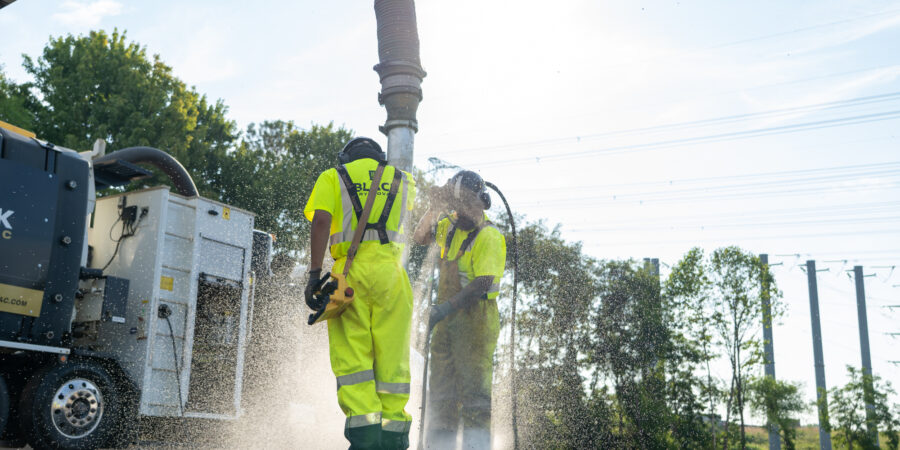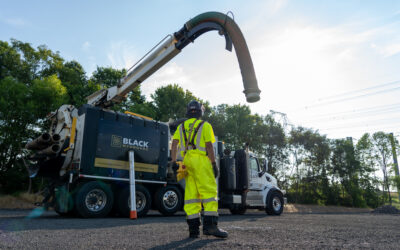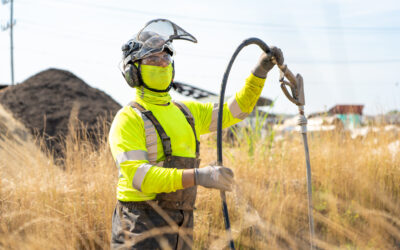Introduction
Vacuum excavation combines precision and power for safe excavation in areas with no room for error — delivering precision and reliability across all places (remote or tricky locations), all conditions (wet, dry, or frozen ground), and all needs (critical, routine, or specialized).
Black Hydrovac is known as a trusted “mission-critical” partner, with a clientele made up of high-profile data centers, energy providers, and federal entities requiring the highest standards. When a contractor utilizes vacuum excavation, it is truly a sign of operational excellence. Our team is proud to have refined it for a multitude of applications.
By the end of this blog, you’ll learn:
- What vacuum excavation is and why it’s becoming the gold standard in utility construction.
- The key differences between hydro excavation (hydrovac) and air excavation (airvac), and when to use each method.
- The wide range of services vacuum excavation supports, from specialized to routine needs.
- How your choice of provider determines whether you get optimal results.
Hydrovac vs. Airvac FAQs
Vacuum excavation is executed through two methods: hydro excavation (hydrovac) and air excavation (airvac). Both are valuable methods, but understanding their applications will help you identify which is best for your project.
What’s the difference?
Hydrovac uses high-pressure water to break up soil, while airvac relies on compressed air. Both use a vacuum system to remove the debris, but are powered by different elements.
What types of projects suit hydrovac or airvac?
Both methods excel where precision and non-destructive excavation are essential. However, the choice depends on specific conditions such as soil compaction, ice, and the utilities present.
What types of soil are best suited for hydrovac and airvac?
Air excavation works best in loose, dry soils like sand or silt. In contrast, hydrovac handles all conditions exceptionally well — especially in dense, clay-rich, or frozen soils where water pressure can more effectively break down material.
Are there any unique advantages to airvac?
Unlike hydrovac, which creates a wet slurry that requires disposal, airvac can repurpose dry, displaced soil for backfill if needed. Airvacs are also able to run other air tools like a jack hammer or air tamper, often used for test pitting in roadways.
Are there any unique advantages to hydrovac?
Hydrovacs can dig through tougher conditions at faster speeds and deeper depths. In the face of cold weather conditions, hydrovacs can utilize hot water to more easily cut though frozen or compacted ground..
Can hydrovac excavate at greater depths than airvac?
Yes, hydrovac generally excavates deeper than airvac. This is where you need trust in your provider’s condition assessment and judgment of soil conditions and other factors.
Services
Vacuum excavation solves a variety of routine and specialized problems. These services range from preventative maintenance to rapid-response solutions. Kristy highlights its versatility, saying, “Vacuums and pressure washers are infinitely useful.”
Utility Test Pits/Daylighting
This process involves digging small test pits to locate and verify underground utilities. Test pitting is sometimes called daylighting since it involves exposing underground utilities to daylight in order to map them out. Without this step, you’re essentially digging blind and pose a risk of utility strikes. This is where the precision of vacuum excavation really shines.
Trenching
Trenching is the process of excavating a narrow, deep channel in the ground, typically for installing utilities such as water lines, gas pipes, and fiber optic cables. In high-risk areas where buried utilities are densely packed or unknown, traditional trenching methods can lead to costly utility strikes and safety hazards. Vacuum excavation provides a safer, more precise alternative.
Remote Excavation
Vacuum hoses extend several hundred feet, enabling excavation in confined or hard-to-reach spaces. With extension hoses, our trucks can reach several hundred feet away to excavate in areas where traditional digging equipment can’t get into. This can come in handy when work is required near restricted or protected areas.
Stormwater Management
Using hydrovac’s jetting capability, high-pressure water clears sediment from stormwater pipes, followed by vacuum suction to remove debris. We work for many municipalities who have discovered vacuum excavation as a preventative measure to keep critical infrastructure clear of debris buildup or a rapid response to storm-related messes.
Debris Removal
Vacuum excavation is extremely useful for site prep and ongoing maintenance tasks, making light work of your biggest messes. Common applications include the clean out of sediment tanks, cooling towers, and filter systems in hard-to-reach places.
Identifying a Reputable Vacuum Excavator
Choosing vacuum excavation is a step toward operational excellence, but the results depend on the provider’s approach. Black Hydrovac’s unique approach is about getting the basics right every time: communicating well and often, being on time and ready to work, having well-kept equipment and well-trained operators, and documenting our work.
Our reputation as a mission-critical partner is no accident – in fact, it’s a result of well-executed jobs with no room for error. We set high standards for ourselves, we always have. Our clients demand that from us because we often work on the most demanding projects in the construction industry.
Vacuum excavation isn’t just an excavation method; it’s a commitment to safety, precision, and operational excellence. For utility contractors striving for superior results, our team delivers.
Get in touch to see how this low-impact, high-powered service can elevate your project quality.




